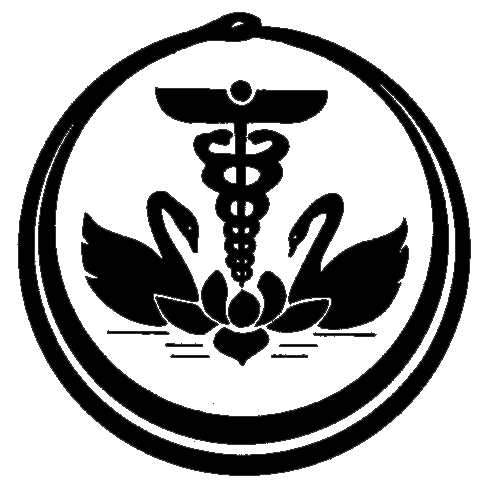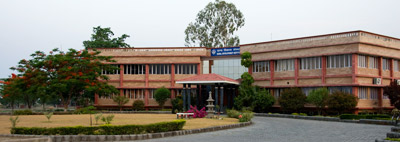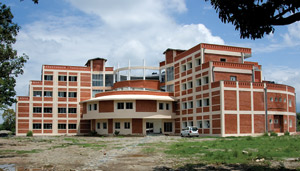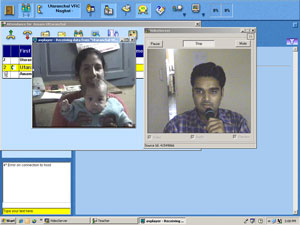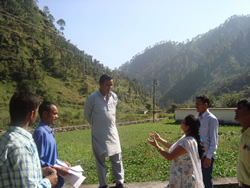“I want to provide medical benefits in the remotest areas of the Garhwal Himalayas. Everyone cannot reach the Himalayan Institute Hospital. Let the Institute reach everyone.” H. H. Dr. Swami Rama
- About Us
- Health & Rehabilitation
- Education & Skill Development
- Adolescents
- Water & Sanitation
- Village Development
- Our Supporters
RDI had its genesis in the early 90s, with focus on serving the hard to reach mountain areas. Guided by the philosophy of ‘Love, Serve, and Remember’ of the founder, the mission of the trust is to develop integrated and cost effective approaches to healthcare and development addressing the local population, which can serve as a model for the country as a whole and for the underserved populations worldwide.
RDI uses a multi-dimensional approach to address locally defined needs and priorities, in order to serve the people at large. Special attention is given to the needs of women and children; to improve health status; provide opportunities for education and social development of children and adolescents
Quality of life is enabled through health, water, education and skill development initiatives. Focus is on grassroots interventions, capacity building of health workers and professionals, evidence based research, use of technology for development as well as providing technical expertise at state and national levels.
The institute hasfull fledged training centre, documentation and media centre, research capabilities and acts as nodal agency in the areas of health and water in the State.
HEALTH
Training and Capacity BuildingStudiesProjectsPublication Media
Primary Health Care
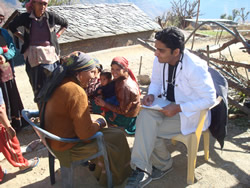 The primary health care model focuses on provision of primary, secondary and tertiary health services in hard to reach mountainous areas.
The primary health care model focuses on provision of primary, secondary and tertiary health services in hard to reach mountainous areas.
Various models have been followed:
- Incorporating primary health with education and livelihood using Gandhian approach of self development
- Focusing exclusively on primary health services through satellite clinics and capacity building right from the village level to 50,000 population onwards
- Conducting health fairs called ‘Swasthya Melas’ where the hospital(including specialist services) is literally taken to the doorsteps of the villages
- Using mobile vans equipped with diagnostic facilities (lab and radiology services) in far flung areas of Garhwal, Himalayas
- Last but not the least, enabling tele-based services Additional features includes provision of dental clinics and specialty camps.
Technical assistance for 12,000 village health workers, their capacity building as well as liasoning with Government officials is being enabled through State ASHA Resource Centre under the National Rural Health Mission.
Reproductive and Child Health
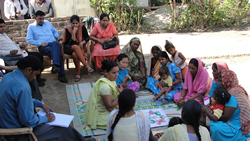 To cater to the needs of women, reproductive health programs address the maternal health issues, family planning and counselling services, antenatal and post natal services and RTI/STI services. In the last two decades more than 3,00,000 women have benefited directly and all women indirectly. Various approaches are used:
To cater to the needs of women, reproductive health programs address the maternal health issues, family planning and counselling services, antenatal and post natal services and RTI/STI services. In the last two decades more than 3,00,000 women have benefited directly and all women indirectly. Various approaches are used:
- Exclusive family planning services – through community based Integrated Approach to Family Planning/ Maternal and Child Health
- Innovative Scheme for small family norms and through Quality Family Planning services at government facilities and institutional setup
Adolescent Health
A prominent feature of RDI’s activities has been on health concerns of Adolescents of Uttarakhand. The focus of these programs has been to improve knowledge, attitude and behaviour regarding general health, hygiene and reproductive health practices, to reduce prevalence of RTI/STI among adolescents, to reduce prevalence of anaemia among adolescents, to enhance emotional health and internal development of more than 200000 adolescents.
Rehabilitation
Taking community participation deeper and involving community members across different abilities efforts are made to mainstream People with Disability by making efforts for mass awareness generation program, capacity building and service delivery. The Institute is registered with the National Trust, Government of India.
EDUCATION
Training and Capacity BuildingProjectsMedia
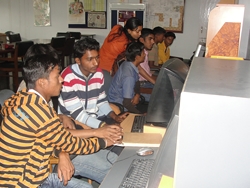 Education and training is the backbone of our work starting with non-formal education the focus has been to promote education across all age groups, ensuring that even drop outs are taken care of through functional literacy and skill development, as well as set up of libraries.
Education and training is the backbone of our work starting with non-formal education the focus has been to promote education across all age groups, ensuring that even drop outs are taken care of through functional literacy and skill development, as well as set up of libraries.
Scholarship Programs are supported both by individuals and groups (Spanish Scholarship, Caring Hand) by providing student support in the form of fees, uniforms, hygiene kits and workshops and camps for the scholars Adolescent Resource Centre is to foster alliances that benefit youth and to provide education and information that support the health and well being of adolescents.
It is an initiative to promote vocational trainings among rural youth enabling them employment by exposure to practical training courses like Industrial Sewing Machine Operation, Plumbing, Fashion Designing, Computer Hardware, and Mobile Repairing.
The Skill Centre aims to deliver skills comprising the technical trainings and other domain specific skills of varied nature. Students, youth, men and women, Workers seeking certification of their skills acquired informally, other social and economically vulnerable people are main target group of this initiative. Different levels of programs are designed to meet demands of various target groups.
- Skills for Employment in Apparel Manufacturing -(SEAM) – supported by IL&FS 38
- Mobile repairing- supported by Ministry of Small & Medium Enterprises (MSME) 24
- Computer Hardware & Networking- supported by Ministry of Small & Medium Enterprises (MSME) 21
- Fashion Designing- supported by Ministry of Small & Medium Enterprises (MSME) 24
ADOLESCENTS
Training and Capacity BuildingStudiesProjectsPublication Media
A prominent feature of RDI’s activities has been on overall development of adolescents by focusing on health concerns of Adolescents of Uttarakhand. The focus of these programs has been to improve knowledge, attitude and behavior regarding general health and hygiene, reproductive health practices, to reduce prevalence of anaemia among adolescents, to enhance emotional health and internal development of more than 200000 adolescents.
Our adolescent interventions stretch out in all the three levels of Himalayas- Upper (Uttarkashi), Middle (Tehri, Chamoli, Nainital) and Lower(Udham Singh Nagar, Dehradun, Haridwar)-to reach out to the needs of adolescents in far-flung areas.
Prominent features of these interventions have been
- Radio programs
- Jamboree (Balika Sammelan)
- Pehal Committees (Adolescent groups)
- Puppet shows
- Development of Kits (Health, Nutrition, Life Skill & Livelihood)
- Establishment of Adolescent Resource Center
- Counseling/ Health Checkups
- Training of Peer Leaders
- Self Awareness Workshops
- Skill Development Workshops to offer trainings on
- Home decorative items
- Jewelry Designing
- Paper bags
- Meeting with Stakeholders
- Government Linkaging and Laisoning
- Cluster Meetings of Peer Group Educators/ Sakhis
- Exposure visits
Development initiatives focus simultaneously on adolescent boys and girls, depending upon the ground needs. 1331 Sakhis and 1600 Peer Group Educators were identified. Reaching out to the adolescents, Sakhis and Peer Group Educators would conduct weekly sessions to help resolve issues of their adolescent groups.
Emphasis was given to experiential learning by taking the group to different Government and Non Government Service Departments and thus broadening their horizons of understanding.
RDI’s expertise lie in offering grass root as well as technical services to different development agencies across the state. Often adopting interactive methods using local dialects the publications have been directed to address health needs that would bring about a change in overall quality of living.
WATER & SANITATION
Training and Capacity BuildingProjectsPublication Media
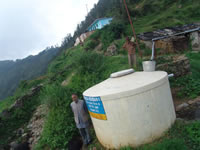 While the Garhwal region is known for its abundant rivers and streams, many villages still struggle to find access to safe drinking water. In addition, a lack of sanitary facilities in the villages can lead to preventable diseases. Drawing on the community members as their greatest resource, RDI has developed programs that address issues of local sanitation and sustainability through community involvement and empowerment.
While the Garhwal region is known for its abundant rivers and streams, many villages still struggle to find access to safe drinking water. In addition, a lack of sanitary facilities in the villages can lead to preventable diseases. Drawing on the community members as their greatest resource, RDI has developed programs that address issues of local sanitation and sustainability through community involvement and empowerment.
The objectives of the program are:
- To provide potable water
- Increase sanitation coverage
- Improve Health & Hygiene awareness
- Enhanced access to information and knowledge and capacity building,
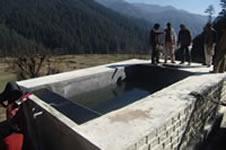 Women’s empowerment
Women’s empowerment- Improvement in quality of life
- Substantial reduction of Water borne diseases.
In the two decades over 150 villages have been provided a composite water and sanitation scheme; supported by national and international with corporate bodies.
VILLAGE DEVELOPMENT
Training and Capacity BuildingStudiesPublication Media
Decentralized Planning
RDI as a part of Backward Region Grant Fund (BRGF) project is providing technical support to Tehri District enabling decentralized planning for 5 years along with annual plans.
Village Resource Centers
HIHT RDI together with ISRO has established VRCs for addressing various needs of the local communities such as education, health, weather, agriculture, natural resources and livelihood opportunities through IT space services. HIHT works as an expert centre for medical facilities to the 16 VRCs setup up by ISRO in the state of Uttarakhand. Telemedicine and tele-education are main highlights of this scheme.
Livelihood
Building sustainable economies is essential to empowering rural communities. RDI works to strengthen the existing sources of income- agriculture and livestock, as well as develop off-farm vocations. Sources of income are limited in the hills of Uttarakhand, so creating alternative means of employment becomes an essential step in rural communities.
RDI has successfully developed options for farm activity like organic farming, bee keeping, mushroom and Basmati cultivation. The program also supported formation of Farmer Interest groups which are totally independent today. The Tailoring unit offers offering sustainable livelihood options to the women-folk by preparing team for self sustenance both in tailoring, embroiling and handicrafts.
Currently unit is running a project on Aromatic and medicinal plant value like Rosemary, Rani sahiba, Pyrethrum, and Salvia.
OUR SUPPORTERS
HEALTH
|
|
|
|
|
|
|
|
|
|
|
|
|
|
Contact us at rdi@hihtindia.org, 91-135-247-1426 or 91-135-247-1427. Or find us on Facebook.
